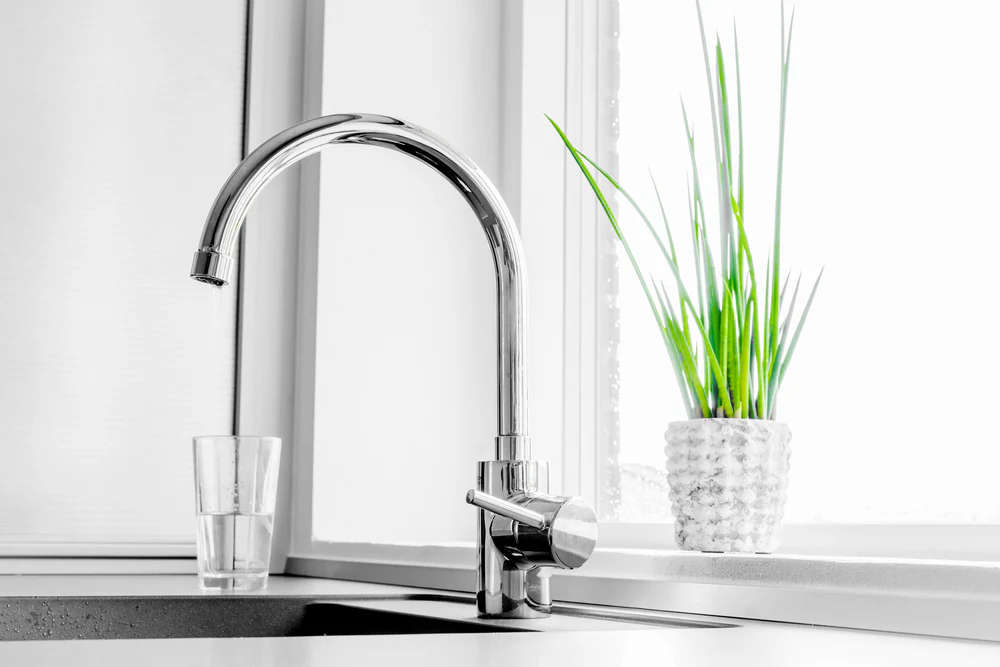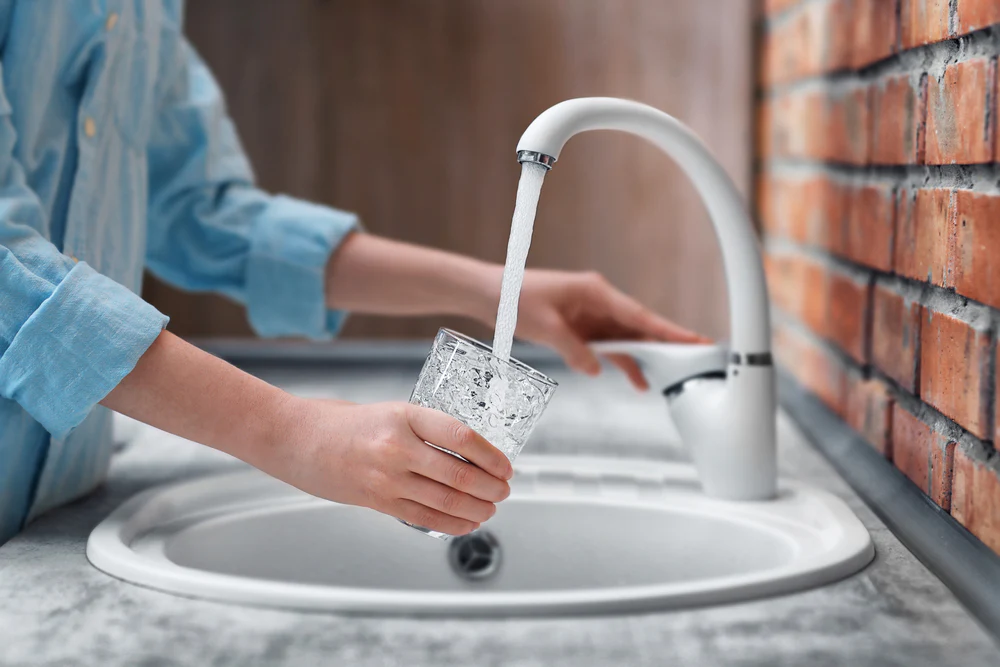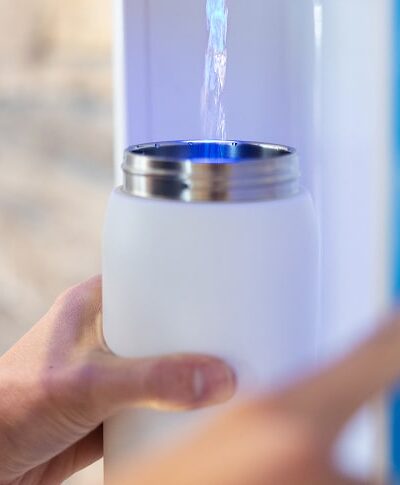Updated July 7, 2024
Thirsty for a large cup of cold water on a summer day? You may have to think twice. Many homeowners simply assume their tap water is clean and healthful, but that’s not always the case. Tap water often contains contaminants, even when it looks and tastes just fine. Some impurities are relatively harmless, but others are toxic or can wreak havoc on appliances and fixtures.
To ensure you’re drinking clean water, it’s best to invest in a standard faucet mount filter, also known as a tap water filter, for your kitchen faucet. It’s especially important now as people are at home more than ever and relying on their tap at a greater rate. Faucet filters remove contaminants found in tap water, including bacteria and heavy metals like lead, encourages hydration, and protects the environment by reducing the need for plastic, all of which provide an overall healthier experience.
If you’re in search of your home’s next water faucet filter, follow the link to learn more about FloWater’s Flo Faucet and how it could change your home’s water quality today.
Removes Contaminants Found in Tap Water
The main reason to install faucet filters in your home is to have a water filtration system that can remove the lingering contaminants found in faucet water. The Environmental Protection Agency (EPA) implemented standards on the amount of over 90 contaminants found in drinking water. There are regulations for chemical contaminants, such as arsenic, lead, copper, and microbial contaminants, such as coliform and other bacteria.
The assigned legal limit reflects the level that protects human health. However, states can enforce more stringent standards as long as the minimum EPA levels are upheld. Each year, water suppliers are supposed to issue a Consumer Confidence Report to detail the quality of your tap water. As we’ve learned over the years, not all municipalities follow the same protocols. Some have less stringent testing or outdated plumbing systems that make the drinking water for residents non-potable.
A faucet water filter strips out these contaminants from your tap water. FloWater, specifically, goes through an advanced process of purification that first filters out dirt, rust, and solid sediments found in faucet water. It then filters out smaller particles, such as radon, hydrogen sulfide, and other impurities found in tap water via an activated carbon filter. This also removes any unpleasant odors and tastes. Some filtration systems require a filter replacement after a certain period of time. It is essential to remember to purchase a replacement filter cartridge, should you need one, to ensure there is no wanted buildup from those contaminants. This can prevent the water filter system from purifying water successfully.
In addition, the FloWater faucet water filter removes bacteria and heavy metals, such as lead that also commonly makes its way through plumbing systems and into your tap.
Minimizes Buildup of Bacteria and Heavy Metals
The third step in FloWater’s purification process uses an advanced reverse osmosis filter method to remove any remaining contaminants or dissolved solids, such as lead, bacteria, heavy metals, and viruses. It’s five times more efficient than anything else available on the market today. Increased activity at home means you and your family are relying more on your tap water as your go-to source of hydration. A faucet filter can ease concerns about the quality of your tap water.
Eliminates Lead Leached from Outdated Water Systems
Many municipalities and homes have outdated water filtration systems that use lead pipes to transport water from its source to your tap. Homes constructed prior to 1986 have a higher likelihood of containing lead pipes or use lead soldering for brass fixtures. Over time, corrosion dissolves the metal and causes a chemical reaction that allows lead to leach into the water.
Modern day water filtration systems are required to follow the requirements set forth by the EPA’s Lead and Copper Rule, but older systems take time and money to replace, which often delays progress for city plumbing systems. Since lead accumulates in the body over time, the longer you are exposed to it, the more it builds up and can cause adverse effects.
Children and women who are pregnant are especially susceptible to lead exposure. A faucet filter removes any traces of lead in drinking water, making it safe to consume.
Encourages Hydration During the Day
Although everyone knows drinking water is healthy for you, you’re more likely to drink the recommended amount of water per day when it comes from a trusted water filter system and simply tastes good. While most tap water is deemed safe to drink, the look and taste may not be appealing. Sometimes, filtered water and unfiltered water have visibly noticeable differences. The type and amount of sediment and chemicals present in your tap water may result in discoloration and an unpleasant smell and/or taste.
For example, hydrogen sulfide is often linked to the smell of rotten eggs, and copper may tint your water a red-orangish hue. Neither are appealing when you want to quench your thirst. As a fresh alternative, FloWater’s coconut carbon filter delivers a unique finish by using real coconut husks to trap any lingering particles and leave behind a crisp, refreshing taste.
With people primarily working from home and kids remote learning, water is the best way to keep everyone hydrated. Having a great-tasting, ready-to-go solution in place encourages everyone to drink more water versus caffeinated or sugary drinks throughout the day that aren’t beneficial to your health. Staying hydrated helps to improve energy and mood levels and boost the immune system.
Protects the Environment by Eliminating Plastic
Rather than rely on plastic water bottles, a faucet filter helps to minimize the use of plastic in your home. This cuts down on the amount of microplastics and toxins you consume and that are released into the air. It also saves on costs from purchasing cases of bottled water or water jugs month after month.
The recommended daily water intake is at least eight glasses of water a day. Multiply this by 30 days in a month, and the number single-use plastic water bottles needed to fulfill this quickly adds up. By investing in an at-home faucet filter, there’s no limit to the amount of purified water you have at your disposal each month.
Additionally, since a faucet filter encourages the use of reusable water bottles, you can take them on-the-go when you do return to work, travel, or head out to sporting events or activities. It saves on costs from buying bottled water in stores while maintaining the convenience of having filtered water available to you at all times.
Differences in Filtration Systems
Now that you understand more regarding why a faucet filter is a smart investment for your home, it’s good to know a little more about filtration systems in terms of how they work and their level of effectiveness. Among the ones outlined by the Centers for Disease Control and Prevention are reverse osmosis, distillation, and UV treatment systems.
Reverse Osmosis
When it comes to at-home use, reverse osmosis is one of the most popular filtration systems. This process filters the water through a semipermeable membrane that captures the smallest contaminants often found in tap water for a high level of purification.
One of FloWater’s seven filtration steps includes this process. In the third step of the initial purification stage, the advanced osmosis filter removes bacteria, lead, viruses, heavy metals, and other dissolved solids. It differs from regular reverse osmosis because it also adds back essential minerals and electrolytes stripped out during this process to replenish the valuable part of tap water and leave out the bad.
Distillation
Distillation follows a process of heating water to a boiling point and collecting the water vapor as it condenses, which leaves many of the contaminants behind. It’s deemed highly effective in removing bacteria, viruses, and chemical contaminants such as arsenic, chlorine, lead, and nitrates.
This process also removes valuable minerals and elements like sodium and magnesium found in tap water without replenishing the water. For many, it doesn’t leave a pleasant taste and doesn’t maintain the value of drinking water for nourishment.
Ultraviolet Treatment
This water treatment is a process that uses ultraviolet light to disinfect the water. While this method helps to eliminate bacteria and viruses, it doesn’t remove contaminants like heavy metals, nitrates, and other chemicals found in the water. It requires pre-filtration to reach the same levels of effectiveness of reverse osmosis or distillation.
Each of these filtration methods offer their own benefits. However, since filters can’t differentiate between what’s a valuable mineral or a harmful chemical as it removes pollutants from your tap water, having a system in place that both purifies and improves the water is key.
Part of FloWater’s advanced purification process involves an alkaline enhancement and electrolyte enhancement to deliver essential minerals back to the water. The alkaline enhancement filter adds minerals to regulate the pH level of the water and neutralize acidity in the body. After this step, the water is enhanced with magnesium, sodium, calcium, and potassium to help keep you energized and hydrated throughout the day.
Installing a Faucet Filter for Safe Drinking Water
Staying hydrated is one of the pillars of good health and having access to clean water at home is important. FloWater’s faucet filter eliminates 80+ known contaminants by purifying your tap water via a five-stage micro carbon block filter process. It also reduces microplastics frequently found in tap water. Plus, it provides two times the flow rate of a typical faucet filter.
With easy installation offering purified water at all times, it’s an investment into your health and motivates you to drink more water. Without knowing what’s present in your water at all times, your tap water may not be as safe as what’s regularly reported. Installing a faucet filter ensures that contaminants, impurities, and other particles that make their way into your pipes and come out of your tap are eliminated. The result is healthier, great-tasting water to keep you hydrated at home.
Sources:





